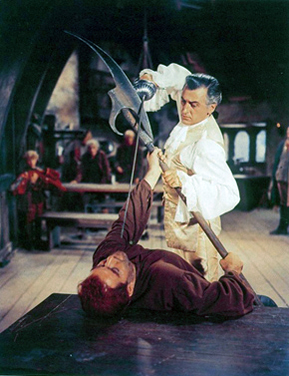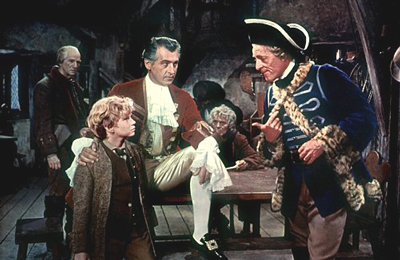
 |
|
|
|
The great director Fritz Lang's American films were often admired, but he was far from a popular figure around town. A number of actors wouldn't work with him twice, although he maintained a multi-picture business relationship with Joan Bennett. Hollywood crews especially disliked his autocratic manners on the set, disparaging him as a dictatorial Prussian despite the fact that he was a refugee from Josef Goebbel's Nazi film industry. It took Lang several years to fully adjust to the English language, but Hollywood really didn't take to him. Even fellow expatriates Peter Lorre and Marlene Dietrich had issues with the man who had once been the most powerful director in Europe. The Hollywood studio system has generally been flexible to any director whose films made money, but the powers-that-be at MGM intensely disliked Lang's first American film, a drama about lynching. Lang was the opposite of a submissive employee, and the front office hated him. An MGM executive attending a preview reportedly said that Fury was "a lousy one from this lousy German son of a bitch -- not worth looking at." Fury went on to be a big hit. Lang did a number of films at Fox but mostly bounced between studios and independent producers, making fascinating pictures but only a few more hits. He returned to MGM only once, for 1955's Moonfleet, a swashbuckling boy's adventure set among smugglers on the Dorset Coast in the middle 1700s. Coming on only two weeks before filming began, Lang was not allowed to tinker much with the script. He did not have final cut on the film and was not pleased with the result, which editorially resembles other early CinemaScope costume dramas from MGM. 
J. Meade Falkner's novel has classic lines that screenwriters Jan Lustig and Margaret Fitts (Stars in My Crown) tilt toward a harsh vision of a world run by greed and self-interest. Smuggler-rogue Jeremy Fox (Stewart Granger, more melancholy than usual) is upset when the young but determined John Mohune (Jon Whiteley, excellent) shows up in Moonfleet, a notorious smuggler's roost. John is the heir to the fallen Mohunes, who built the local church but lost their fortune; the Mohune mansion is the source of many legends. For his protection, John's dying mother has sent him to Jeremy Fox. Jeremy was once her lover, until the cruel Mohunes turned the dogs on him. Fox still carries huge scars on his back. Jeremy Fox has recently returned from misadventures abroad, with Mrs. Minton, a jealous mistress (Viveca Lindfors). He tries to ship John off to school or to the colonies, to no avail. The boy continues to idolize Fox even after learning that he is the leader of the smugglers. Fox is on the verge of a new colonial swindle with a pair of decadent nobles, Lord and Lady Ashwood (George Sanders & Joan Greenwood). In the tomb of his ancestor, John discovers clues that might lead to the missing Mohune treasure, a fabulous jewel. It's just what Jeremy needs to buy his way into the Ashwood scheme. But even as he prepares to steal John's inheritance, Jeremy finds himself attracted to the boy's innocence and loyalty, and the memory of his lost love. The unusual Moonfleet is a strange mix of romantic themes and Lang's own predilection for stories about implacable fate. On one hand Jeremy Fox is a standard rogue adventurer with a checkered past, engaged in crime but redeemed by idealistic sentiments. Lang engages well with the mysterioso atmosphere, as the film abounds with creepy graveyards, criminals hanged at the crossroads, secret passages below stone churches and a tombstone angel that stares like a demon. But Lang shows little interest in the story's gallery of supporting characters. The star billing goes to the villains George Sanders and Joan Greenwood, who do little more than chortle greedily and encourage Jeremy to kill John Mohune and be done with him. The production strives to make a "big-looking" movie within the faltering MGM studio-- we're told that it is Lang's most expensive American production. But the costumes and interior sets are stock items, and most of the lighting is not up to Lang's standard. The opening scenes evoke some of the mood of David Lean's Great Expectations, with the frightened John stranded on the lonely moor. But the "advantage" of CinemaScope seemingly impairs Lang's usually exacting editing rhythms. Lang also seems uncomfortable with the requirements of filling the frame, with the result that most of the secondary characters get few close-ups, and potentially interesting characters, like John's little friend Grace (Donna Corcoran) are seen mostly in long-shot. The 'Scope frame enables a few forced "trick" compositions, like a John's-eye view of a circle of staring faces, and a fight with a long-pole Halberd that swings the entire width of the screen. But the lack of wide angle anamorphic lenses works against John's rope-bucket descent into a claustrophobic well. In the wide format, the well looks far too big. 
Alan Napier has a nice bit as a friendly parson but the wide framing of scenes restricts many of the supporting players to the background -- Sean McClory, Jack Elam, Dan Seymour, Ian Wolfe, Skelton Knaggs. The expressive, beautiful Viveca Lindfors (These are the Damned) apparently didn't inspire Lang at all: her pivotal character is treated as a nag, and made unattractive with exaggerated makeup. An awful hairstyle, drawing her hair into a tight knot atop her head, makes her look like a cooked onion. Standing sets and the L.A. location of Portuguese Point represent the English seacoast. I've not heard it mentioned, but it seems logical that the enormous interior-exterior sets of the moors, horse paths and crumbling Dorset buildings were repurposed and altered from MGM's Brigadoon made just previously -- we even see patches of yellow "heather" springing up here and there. Producer John Houseman had a prestigious string of accomplishments at MGM, and Moonfleet may have been a 'budget' effort in between more lavish pictures for Vincente Minnelli -- The Cobweb, Lust for Life. One real indicator of stiff economizing is the main title sequence, where shots of ocean waves are meant to lap-dissolve behind the dissolving text. They instead cut together and look like a serious mistake. Apparently a reshoot wasn't in the cards. 1 The ending of Moonfleet is so strong that even indifferent editing (could Lang have improved it?) cannot dent its magical spell. The badly wounded Jeremy Fox honors John Mohune's comradely trust, which turns out to be the only vestige left of chivalry. (The genre also teases us with the possibility that John could be Jeremy's son.) Critic Andrew Sarris envisions this poetic conclusion as a recreation of the myth of the Flying Dutchman, with Jeremy perhaps doomed to wander the seas until he truly deserves John's faith in him. The final image of John reopening his ancestral home carries a strange feeling of bleak optimism. 2 I normally blanch at the notion of remaking movies by great directors, but the untapped riches of Moonfleet could be interpreted in a half dozen interesting directions. 
The Warner Archive Collection DVD-R of Moonfleet is a clean and colorful enhanced transfer of Fritz Lang's only CinemaScope production (his next two films were in the compromise format SuperScope). Colors are good, if a bit hazy; Robert Planck's rich images show off those enormous MGM cycloramas with their painted stormy skies. The soundtrack features an expressive score by Miklos Rozsa, who at the time was a go-to composing talent for both MGM and producer John Houseman. The disc carries no extras.
On a scale of Excellent, Good, Fair, and Poor,
Moonfleet rates:
Footnote:
1. Brigadoon -- now there's a flawed fantasy that could benefit from some of Fritz Lang's formal fatalism. As I write in my review, even the basic plot could use some straightening out.
2. This 'bleak optimism' is comparable to the conclusion of Jacques Tourneur's Out of the Past. Both films end with characters going forward with their lives, having been falsely informed about the person they most loved.
Reviews on the Savant main site have additional credits information and are often updated and annotated with reader input and graphics. Also, don't forget the 2010 Savant Wish List. T'was Ever Thus.
Review Staff | About DVD Talk | Newsletter Subscribe | Join DVD Talk Forum |
| ||||||||||||||||||